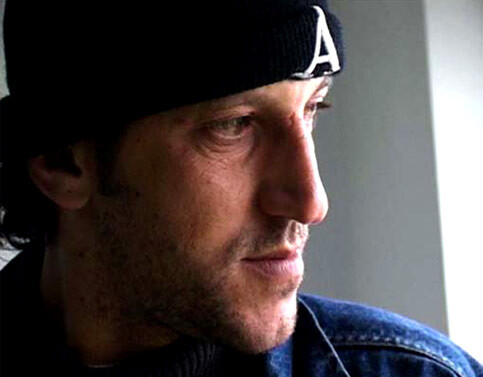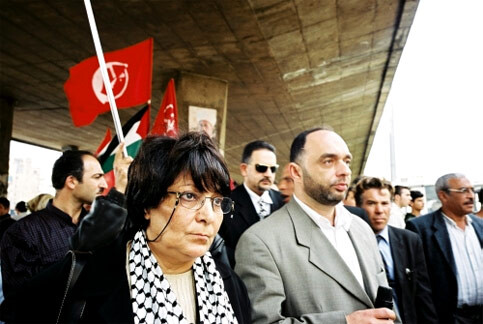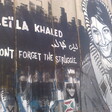The Electronic Intifada 9 April 2007

Ali Abu Awwad in Encounterpoint
When she hijacked two planes over thirty years ago, refugee Leila Khaled helped put the Palestinian struggle on the international radar. A generation later, however, the realization of Palestinians’ rights is elusive as ever and the tactics of their resistance are increasingly scrutinized. The limits of resistance are examined in Ronit Avni and Julia Bacha’s documentary Encounter Point as well as Lina Makboul’s Leila Khaled, Hijacker.
Encounter Point appropriately opens with a wide shot of two parallel roads, suggesting that there are two worlds existing side by side in the same place. Indeed, this is confirmed within the first few minutes of the film, as Israeli citizen Shlomo Zagman breezes through a West Bank checkpoint with a friendly wave from soldiers while Palestinian Sami Al-Jundi waits in an endless queue of Palestinian vehicles at a decidedly less friendly checkpoint.
In the film we meet Israelis and Palestinians from the Bereaved Families Forum, which brings together those from both communities who have lost family members to political violence. Particularly memorable are Robi Damelin, whose son was killed by a sniper while manning a checkpoint guarding a settlement, and Ali Abu Awwad, whose unarmed brother Youssef was killed by an Israeli soldier during an army raid.
Damelin, who grew up in South Africa, struggles with her own principles as she appeals to skeptical Israeli audiences. Unable to contain her anger at a visit to a settlement in the Gaza Strip where an audience of visitors is told that Israelis have a God-given right to the land and that the Arabs have it pretty good, Damelin interrupts, exclaiming, “[That’s] exactly what whites said about the living standards of blacks” in apartheid South Africa. And when she is asked on Israeli television what she would like done to the sniper who killed her son, she replies, “You cannot kill anyone in the name of David. What I’m focusing on is, why was David in the Occupied Territories? Why was David guarding settlers who said their safety is worth more than David’s life?”
There are scenes of Damelin at peace rallies in which she is shown holding signs critical of the Israeli occupation. She stands out from the other Israelis featured in the film, like Tzvika Shahak, whose daughter Bat-Chen was killed in the 1996 Purim suicide bombing. Also a member of the Bereaved Families Forum, Shahak believes that the suicide bomber who killed his daughter is someone to be pitied, and rather than motivated by nationalist aims, he was brainwashed by metaphorical “drug dealers” who should be “taken care of” by Israel. We later see Shahak speak to some young Israeli teenagers, likely on the brink of being conscripted into the military. After speaking to the kids, Shahak explains that serving in the army is important — that “we have to stay strong and also have dialogue.” Damelin’s stand seems more honest — how can one be in a coexistence group yet still believe the occupation is necessary?
Problematically for those who do not have a strong background in the conflict, the film — produced by the self-described non-political group Just Vision that advocates non-violence — does not provide much context. In the beginning of the film viewers are informed, “Palestinians struggle to end Israeli military occupation and create an independent state” while “Israelis act to secure themselves against attacks by Palestinians, nearby states and militant groups.” The viewer is left with the sense that if Palestinians and Israelis would just recognize their shared humanity, the oft-cited cycle of violence could finally come to an end.
Such a message equivocates the situation and makes it appear as though the two parties are equally responsible for the “cycle of violence.” The film seems to suggest that the conflict is primarily psychological — one that can be overcome by encounters — rather than one stemming from a systematic disparity in rights. For a film focusing on the experience of the bereaved, it is surely a questionable omission that there is no mention of the massive disparity of Palestinian versus Israeli deaths during the last six years of intifada and indeed six decades of conflict. The film does not go into the roots of this conflict, the dispossession of the Palestinian people when an overwhelmingly non-Jewish country was turned into a “Jewish state” during the war of 1947-48 and the colonization of Palestinian land ever since.
However, we are given glimpses of the heart of the matter, those uncomfortable truths that many would prefer to ignore.
Doe-eyed Palestinian Aziz Tazi works with Israeli Ruti Atmoson on an Israeli-Palestinian joint publication. “We’re working for peace,” he says, but describes how Israel refuses to grant him permission to enter Israel, so an Israeli coexistence delegation must come to the West Bank to visit Tazi and some other Palestinians. The delegation is held back by Israeli authorities and yet they balk at Tazi’s suggestion at circumventing the checkpoint by driving through the Palestinian town of Tulkarem. A large group of Palestinians wait with Tazi as he argues with Atmoson on the phone when she asks him if they could meet at a different place. “If they don’t come, no one would come to another meeting. They’ll lose trust,” he frets. Though the Israelis eventually do show up, many of the Palestinians who came to greet them had already left. In this and other instances, it appears as though it is generally the responsibility of the occupied Palestinians to accommodate the Israelis, starkly reflecting the imbalance of political power between the two peoples.
Ali Abu Awwad can only nod in agreement when he asks a Palestinian in Hebron whose house windows were recently smashed in how he lives with the settlers. “The situation was imposed on us,” the Palestinian man shrugs, and the same can be said of the occupation and the Palestinians generally. Abu Awwad deftly yet diplomatically illustrates this when he meets Shlomo Zagman, who was taught while growing up in a settlement that Palestinians “did the work my parents didn’t want to do.” Abu Awwad emphasizes that when there is a cease-fire, the suicide bombing stops in Israel but the Palestinians still have to endure the humiliating occupation. He convinces Zagman to try to see the checkpoints from the Palestinian point of view, which he does by tagging along with the Israeli women’s group Machsom Watch that monitors soldiers’ behavior at checkpoints.
The film is dedicated to those on both sides struggling for non-violence, and the profiled Palestinians and Israelis’ appeals to their respective societies are sympathetically portrayed as noble. However, it is unconvincing that both sides absolutely rejecting violence is the solution since the whole edifice of Israel as a “Jewish state” and the occupation rests on the threat and exercise of violence by Israel. We feel we have hit something closer to the truth with the response of the Israeli founder of the Bereaved Families Forum being asked on Israeli TV about Palestinians who “delight” in the deaths of their children: “Perhaps we should ask ourselves, ‘how did we push an entire population to laud and praise suicide bombers?”
Indeed, the most powerful aspect of the film is the archive footage of the funeral of 12-year-old Bethlehemite Christine Sa’adeh, who is given a final kiss by her mother, whose grief is so profound it is difficult to look at. Her father shouts a message to Israeli mothers: “If you want security, end the occupation. We all stand together until we have freedom and a Palestinian state.” Nonviolence certainly something to aspire to, and something that many international film audiences will not argue with, it is too easy to ignore the more complicated question of when an oppressed people — like the Palestinians — have a right to resist through violent means (and what just means of violent resistance might look like).

Film still from Leila Khaled, Hijacker
Leila Khaled, Hijacker
The supposed moral authority of nonviolent resistance is thrown off-kilter when considering the plight of the five million Palestinian refugees in exile who don’t even have the opportunity for occasional contact let alone normalization with the Israeli other as do their kin in the West Bank. “What language should I use with an occupier? As long as the enemy occupies our country, there’s nothing to discuss,” Leila Khaled unambiguously tells filmmaker Lina Makboul as they talk in Amman, Jordan.
The question of the limits of resistance is compellingly posed in Leila Khaled, Hijacker. Khaled made headlines for herself and the Palestinian people, and as one newscaster put it, added a touch of “glamour” to their struggle when she hijacked a passenger plane in 1969 and then again in 1970. Makboul’s smart film relies on archive material to present a history of Khaled and her feats and juxtaposes it with her interviews with Khaled conducted at her home in Amman and Chatila refugee camp in Lebanon.
Khaled was born in Haifa in 1944 and on her fourth birthday, the Zionist militia called the Stern Gang brutally massacred inhabitants of the village of Deir Yassin, one of many such atrocities that terrified hundreds of thousands of Palestinians into fleeing their towns and villages in face of the Zionist onslaught. Soon thereafter Khaled’s family fled to Lebanon, her father remaining in Haifa to fight the Zionist forces. Makboul uses family photos as a point of reference — the first a cheery image of a young Khaled lined up with her siblings in front of their Haifa home, and the second a rare image circa 1967 of a smiling Khaled — we are told she is smiling because she just purchased a one-way ticket to Haifa, buoyed by the pan-Arabism of Egyptian President Gamal Abdel-Nasser. However, all optimism later dashed by the Arabs’ crushing defeat during that year’s war, Khaled came to the realization that help for her people would not come from the outside and that “she’d have to do it herself.”
Makboul lets archive footage of Khaled’s spectacular hijackings speak for itself, interspersing the footage with interviews recently conducted with passengers and crew on the hijacked planes. The first hijacking went as the Popular Front for the Liberation of Palestine (PFLP) planned, though the Israeli war criminal who was scheduled to be on board, then-Israeli Ambassador to the U.S. (and later Prime Minister) Yitzhak Rabin, had changed plans at the last minute and so they were not able to try him in an Arab court as intended. However, the world did learn of the Palestinian people whose struggle before the late ’60s had largely been forgotten.
Six plastic surgeries later, Khaled managed to hijack another plane in a synchronized attack, also organized by the PFLP. This time Khaled was caught off guard by an El Al security guard on board who managed to disarm her of her two hand grenades, and a fellow hijacker was shot dead. Khaled was detained upon the plane’s emergency landing in London, though aircraft hijacked by other operatives landed as planned in Jordan. Passengers were held hostage until Khaled and her killed colleague’s body were transferred to the Palestinian resistance.
With the first hijacking, “Leila and the Palestinians [were] suddenly world famous,” as Makboul narrates, causing journalists to finally report on the situation in the Middle East. However, the second time around the press coverage was less desirable and what the world remembered was Israeli Prime Minister Golda Meir stating that it is the sole intention of these terrorists to kill Israelis and “this is what their organization stands for.” The Palestinians’ struggle for justice had been eclipsed.
For teenage Makboul, being raised by Palestinian parents in a comfortable suburb in Sweden, Leila “was brave and beautiful. And she was Palestinian,” and thus a figure of admiration. While men sat in coffee shops and uselessly complained about the situation, Leila “did something about it.” However, as an adult, Makboul reflects, “it was Leila Khaled who gave us this [negative] reputation,” and she questions how far one can go “to achieve freedom.”
Makboul meets Khaled in Amman, where “her life is quite ordinary.” Decades after the famous image of Khaled wrapped in a kuffiyeh holding a gun was photographed, Khaled is still recognizable but her appearance is maternal rather than revolutionary. We see her do the mundane, such as vacuum her house, play with her dog, and sit down with Makboul and her family for a large meal, during which she repeatedly urges her guest to eat more.
Asked about her reaction to the 11 September 2001 attacks in the U.S., Khaled replies, “I don’t agree with the murders of civilians, no matter where in the world.” She adds, “As far as I’m concerned, occupation is terrorism. My people have the right to fight it.” Questioned on the tactic of hijacking planes as a means of fighting, Khaled responds, “When we’re tortured in Israeli prisons, who heard our screams?” Hijacking those planes forced the world to sit up and take notice of the Palestinians.
Whether it moved the world to intervene is another question. While a young and beautiful Khaled might have lent the early Palestinian revolutionary movement a shade of romanticism, a trip with Makboul to the Chatila refugee camp in Lebanon — where “the real Palestinians live” according to Khaled — brings us back to the grim reality being lived out by many of those in exile. While a young refugee boy on a bicycle tells the camera crew that Palestinians will return “whatever the price,” Khaled meets an impoverished former comrade whose struggle has been rewarded with very little. Widowed and his children now out of the home, Abu Hisham cannot contain his tears as he talks about his situation to Khaled.
Even now Khaled says she regrets nothing. Still skeptical of the hijackings, Makboul questions if the problem is with herself rather than Khaled’s actions: “I, with my comfortable life in Sweden, would want the struggle for a free Palestine to be fought with discreet diplomacy rather than spectacular skyjackings.”
Of course, the lingering question is how much longer the Palestinians will be denied their right to go home. Asking the crew aboard those hijacked planes if they understand why Khaled did it, the sky hostess aboard the first plane tells Makboul, “It’s still a shame that it’s the way that it is — that the Palestinians don’t have a country.” Did Khaled’s hijackings, plastic surgeries, and revolutionary training bring the Palestinians any closer to freedom?
Makboul interviews the Israeli pilot of the El Al plane hijacked by Khaled, whose skewed Zionist perception of history means he thinks that “maybe 20 or 30” people were killed at Deir Yassin instead of more than 100. Questions regarding the efficacy of violence and the negative reputation of the Palestinians is made all the more complicated by Israel’s own violent birth when Palestinians were forced to march to nearby Arab countries or put on rafts in the Mediterranean.
“I’m confused,” Makboul narrates. “Isn’t terrorism always wrong? Maybe it isn’t. The Stern Gang became celebrated heroes. One of them even became the Prime Minister of Israel. We, the Palestinians, still live with the bad reputation. Maybe it’s OK to be a terrorist. If you win.” As she narrates, viewers see archive footage of an Israeli flag being hoisted atop a pole.
So what to make of those back in Israel-Palestine proselytizing nonviolence in Encounter Point? One wishes the filmmakers would have probed further when Palestinian Sami al-Jundi explains that he used his ten years in Israeli prison as an opportunity to learn from the struggles such as those of South Africa, India, and the U.S. Civil Rights movement. “There are some aspects of their movements [that apply to the Palestinian case] and some that don’t,” he says, so the Palestinians should adopt what makes sense for their situation. Does he mean that there are times when violent resistance is necessary? And besides, to view those analogous cases as absolutely nonviolent is to sugarcoat history.
Maybe the problem is like the one Makboul self-diagnoses. We outsiders would prefer it if the Palestinians didn’t make us feel uncomfortable, and that they remain docile and well-behaved subjects of colonialism even as we place sanctions on them and supply the weapons to Israel that kill them. Ironically, the Palestinian struggle has historically depended on mass nonviolent resistance such as strikes. Now that Israel has managed to erect a physical, economic, and social wall of isolation around the Palestinians and has put them out of view, it is doubtful that those former means of nonviolent resistance would have more than a negligible impact. Sami al-Jundi is right that Palestinians would do well to learn from history and adapt tactics that would bring them closer to freedom. However, concluding that the Palestinians must forego the right to resist through violent means doesn’t come from a very close reading of history.
Both Encounter Point and Leila Khaled, Hijacker will be screened at the Chicago Palestine Film Festival, April 14-26.
Maureen Clare Murphy is Managing Editor of The Electronic Intifada.
Related Links



